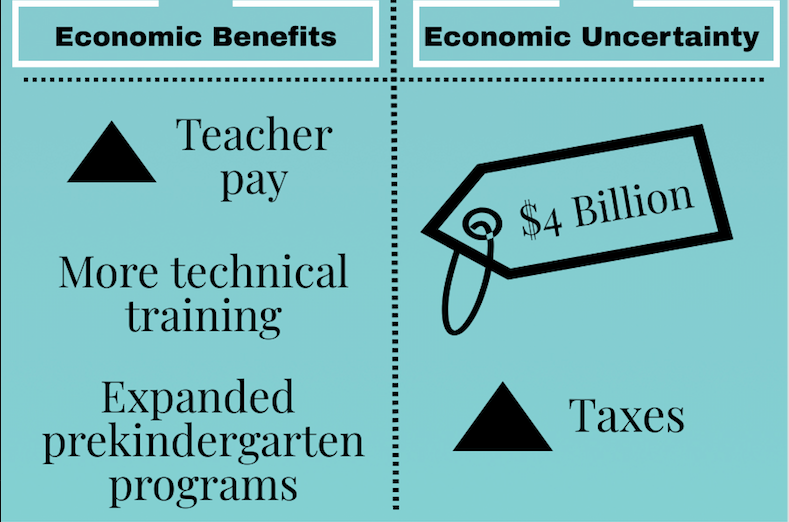Controversial School Overhaul Passes Maryland State Legislature
The controversial legislation commonly known as the Kirwan Commission waits for a final signature from Gov. Larry Hogan.
April 20, 2020
The controversial educational reforms recommended by the Commission on Innovation and Excellence in Education, more commonly known as the Kirwan Commission, passed through the Maryland House of Delegates 96-38 March 17 and the legislation now awaits Gov. Larry Hogan’s signature.
The commission’s recommendations would increase teacher salary, expand pre-kindergarten education to all three and four year olds from low-income backgrounds and fund expanded technical training programs in high schools.
“The commission went through a three-year process of identifying evidence-based policies that will help close achievement gaps and make sure every kid in every zip code has access to a great education,” former MCPS teacher Del. Eric Luedtke told CBS Baltimore. “Passing this bill will be key not just for our kids, but for the economic future of this state.”
However, the Kirwan commission was not without its critics. Even before the Coronavirus outbreak, Hogan was already attacking the Kirwan Commission for its immense costs which he argued would have negative economic ramifications due to likely tax increases at the local level. When the Coronavirus began to take more of an economic toll on the state, Hogan and other Republicans in the state criticized Democratic lawmakers for pushing such costly legislation through the legislature amid the uncertainty caused by the Coronavirus outbreak.
The reforms would cost an estimated $4 billion a year — a hefty price tag in which $2.8 billion would come out of the state government, while the remaining $1.2 billion would be raised by local governments.
“It’s somewhat irresponsible because of the panic and economic uncertainty again not just in the state but nationally and globally. To go forward with a bill that requires $32 billion in spending is a bit irresponsible,” Maryland Senate Minority Whip Stephen Hershey said in a March 15 interview with Fox News.
If Hogan vetoes the legislation, State Democrats who have a veto-proof majority in the state legislature could attempt to override the veto in a special session which is planned to take place in May.
In spite of the costs, the proposals are popular with Maryland Education leaders statewide. Organizations such as the Maryland State Education Association have commended the commission for its increased focus on technical training, pre-kindergarten programs and the increase in teacher pay.
MCPS officials believe that the salary increase for teachers will attract qualified people to go into teaching, elevating the quality in classroom learning.
“I think what you’ll see is a marked improvement in teacher quality. The goal is to elevate the teaching profession so that it is no longer someone’s second or third career option,” Chief MCPS Communications Officer Derek Turner told the Rampage.
Furthermore, a higher teacher salary would likely increase the number of teachers from diverse backgrounds.
“You’d hope that more people will try to become teachers and hopefully with that increased pool, there will also be a more diverse pool,” Director of Innovation for Future Ready Schools Tom Murray said. “Studies have shown that having a more diverse set of teachers both in terms of race and in terms of income is greatly beneficial to students.”
The Kirwan Commission also proposes a redesign of high schools to include more college and career readiness options, in addition to the existing academic track. The proposal would create two advanced pathways — one academic and the other technical — which students would have to test into after the 10th grade.
While unclear how this particular part of the proposal would affect the already existing technical track that exists in MCPS via Thomas Edison School of Technology (TEHS) and other programs, TEHS Principal Shawn Krasa believes that the technical pathway in MCPS will continue to expand regardless of the recommendations of the Kirwan Commission and its potentially rocky future.
“Over the past few years we’ve seen a huge expansion in the number of people going to Edison and taking part in our career pathways, and I think we’re going to see that trend continuing,” Krasa said.
He also talked about the potential benefits of expanding the technical pathway statewide.
“Technical training helps students finish college with a professional certification and helps the students who are going into college have a leg up,” Krasa continued.
While the future of this legislation depends largely one weighing economic factors against the educational benefits of expanded prekindergarten and technical programs, there is evidence to suggest that the Maryland economy would see long term benefits if Kirwan was signed.
According to a Dec report from Sage Policy Group, the state would see more than 10,000 extra women join the workforce and a $6 billion net increase in tax revenue 10 years after Kirwan is put in place.






